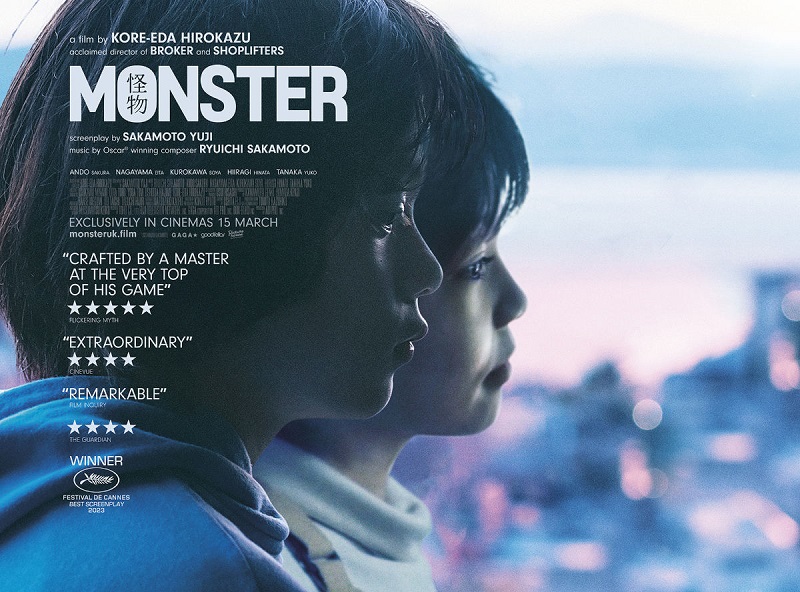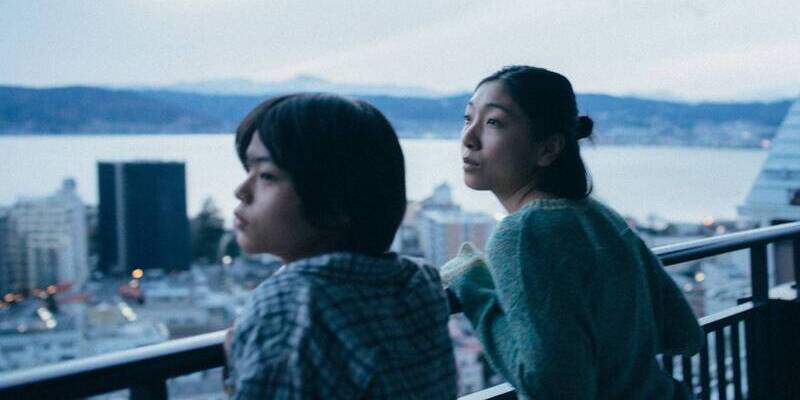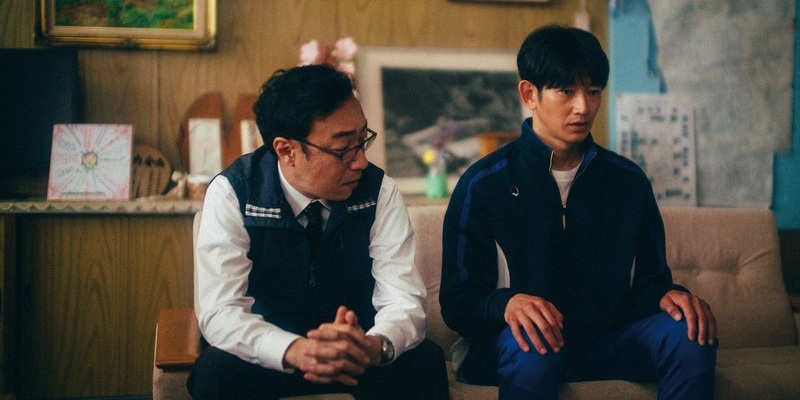
Review by
Eric Hillis
Directed by: Hirokazu Kore-eda
Starring: Sakura Andō, Eita Nagayama, Sōya Kurokawa, Hinata Hiiragi, Mitsuki Takahata, Yūko
Tanaka

When filmmakers adopt a Rashomon approach to their
storytelling, repeating a series of incidents from various perspectives,
it's often gimmicky and cynically employed to cover up what would be an
unremarkable narrative if played in conventional fashion. Not so
Kurosawa's compatriot Hirokazu Kore-eda, whose
Monster uses this storytelling approach to reinforce a
film that is above all a plea for understanding, compassion and
tolerance. In this social media era we've become far too hasty to form
opinions without being privy to vital facts and perspectives. We make
our minds up about public figures we really know nothing about based on
crumbs of information that we arrogantly assume will lead to a biscuit
of our biases. Kore-eda reminds us that we really know very little about
anyone else, not even our own children.

The film - which sees Kore-eda collaborate with screenwriter
Yuji Sakamoto and features a final touching score from the late
Ryuichi Sakamoto - is divided into three chapters, each of which
offers a distinct perspective. The starting point for all three is the
image of a burning building. Who set the fire and why is but one of the
mysteries to be solved over the following two hours.
Watching the blaze from their nearby balcony are widowed single mother
Saori (Sakura Ando) and her young son Minato (Soya Kurokawa). In the days that follow Saori grows increasingly worried about
Minato's odd behaviour. He's become withdrawn and apprehensive; he
returns from school with a plaster on his ear; and he attempts to cut
his own hair off. One night Minato disappears and Saori tracks him down
in a nearby storm drain, where he's found repeatedly shouting the words
"Who's the monster?" On the way home, Minato jumps out of Saori's moving
car, leading to a hospital examination. Interrogating the boy, Saori is
told that he's been bullied by his teacher, Mr. Hori (Eita Nagayama), both physically and verbally.

When Saori takes the matter to the school authorities she's met with a
wall of silence. The principal, Ms. Fushimi (Yuko Tanaka), is
mourning the recent death of her granddaughter in a tragic accident that
saw her husband reverse over the child. She's clearly in no state to be
at work, and her grief makes it difficult for Saori to express her rage
without upsetting this vulnerable woman. Saori's questions are met with
responses read directly from a manual. When Hori is brought into the
room he appears to be either drunk or stoned. A striking shot of a livid
Saori stood in front of a group of people who seem to think she'll leave
if they remain bowed for long enough suggests an unspoken frustration
younger Japanese people might feel towards the rigidity of their
tradition heavy society.
The second chapter rewinds back to that burning building, which we
learn housed a hostess bar frequented by Hori, who is dating one of its
employees, Hirona (Akhiro Tsunoda). The bookish teacher and the
glamour girl are an unlikely pairing, and her mocking of his
intellectual interests suggests it's headed nowhere. The relationship is
further tested by Saori's allegations, which make the local news.
Through Hori's perspective we're given new contradictory evidence
regarding what is really up with Minato, who Hori believes is the
ringleader in the bullying of Yori (Hinata Hiragi), a sensitive
classmate ostracised for his effeminate nature. This segment plays like
a companion piece to the recent German drama
The Teachers' Lounge, whose protagonist is shunned by her fellow teachers, her pupils and
their parents in a similar manner to Hori. Like that film it highlights
the precarious nature of being a teacher in today's world where parents
assume they know more about their children than the professionals who,
in many cases, spend more time in their kids' company.

The third and final segment gives us the most vital perspective of all,
that of Minato, as it focusses on the truth of his relationship with
Yori. Minato is drawn towards Yori's intelligence and the two bond over
a shared wonder of the world, making an abandoned railway carriage their
secret hideout. There are shades of Lukas Dhont's
Close
as Minato treats his friend coldly in public, ashamed of his feelings
for his put-upon classmate. When Yori confesses to understanding why
Minato might not want to be seen in public with him it's a gut-wrenching
moment. What's most heartbreaking is how Yori continues to smile
throughout his torment. He's accepted it as a fact of life.
This segment could almost be viewed in isolation and still work as a
standalone film. There are some small flaws in the preceding chapters -
a few details that seem to be inserted to mine drama in the moment but
which are never satisfyingly cleared up as the truth unspools – but we
quickly forget them as we become engrossed in Minato and Yori's story.
It's a charming portrayal of childhood innocence but also of the cruelty
passed down by the adult world, and the two central performances are
remarkably affecting. I'm not going to reveal how it all pans out, but
the threat of tragedy looms large, partly because of the film's ominous
title and partly because souls as pure as Minato and Yori don't tend to
fare well in societies as traditional as Japan's. Like his young
protagonists, Kore-eda asks "Who's the monster?" You may not like the
answer.

Monster is on UK/ROI VOD now.

